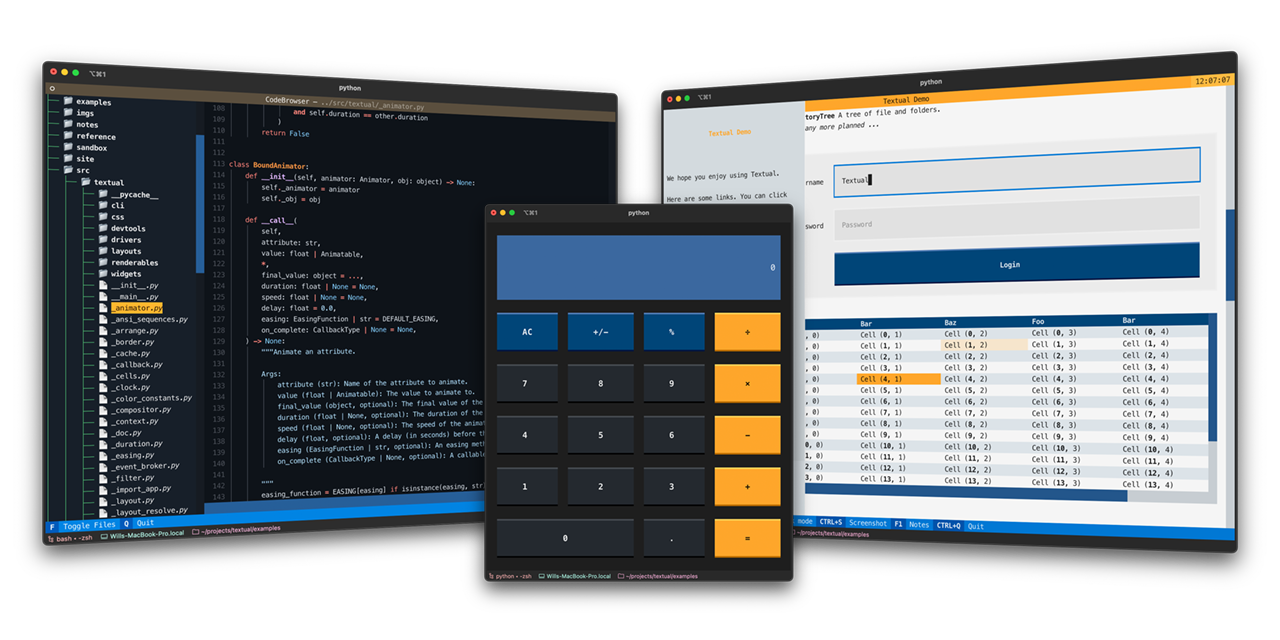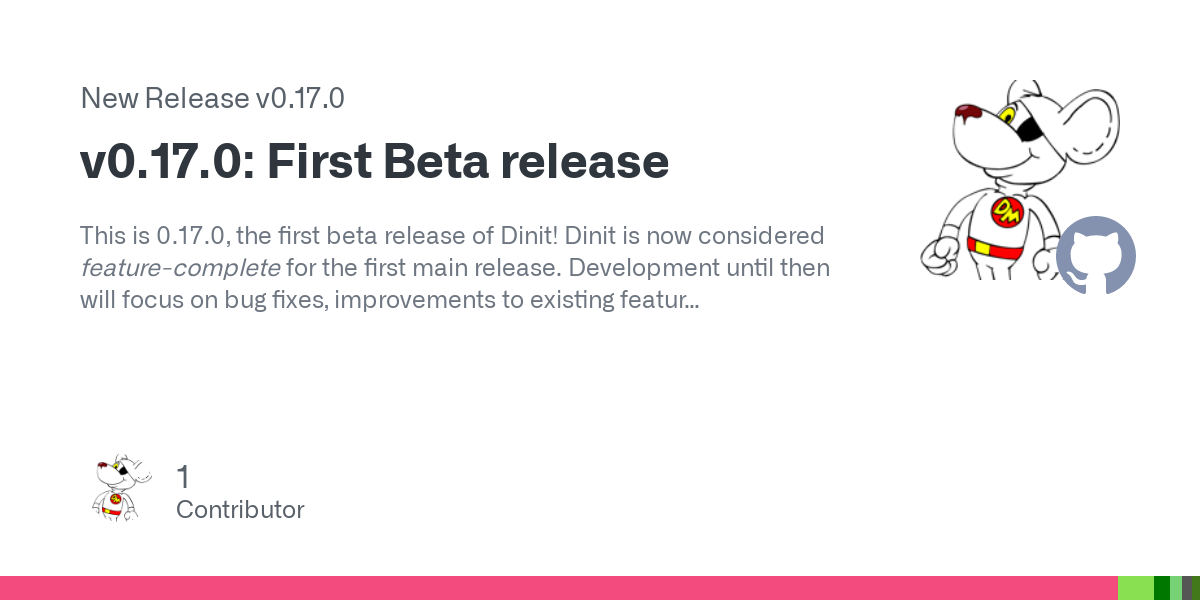 Andy
Now
•
100%
Andy
Now
•
100%
- https://www.altap.cz/
- Files
- Double Commander
- Dolphin
- mucommander
In no particular order.
 Andy
Now
•
88%
Andy
Now
•
88%
Ah yes you can tell by the post title:
best linux terminal emulator
 Andy
Now
•
94%
Andy
Now
•
94%
For me: Wezterm. It does pretty much everything. I don't think Alacritty/Kitty etc. offer anything over it for my usage, and the developer is a pleasure to engage with.
Second place is Konsole -- it does a lot, is easy to configure, and obviously integrates nicely with KDE apps.
Honorable mention is Extraterm, which has been working on cool features for a long time, and is now Qt based.
 Andy
Now
•
100%
Andy
Now
•
100%
Just note that the comment was inaccurate, in that their weird encryption is indeed open source at least.
 Andy
Now
•
100%
Andy
Now
•
100%
I suggest trying this one for Zsh, over the more common one: https://github.com/zdharma-continuum/fast-syntax-highlighting
 Andy
Now
•
100%
Andy
Now
•
100%
As someone else said, setting less' jump value is helpful.
Another tool I use, mostly for the zshall manpage, is https://github.com/kristopolous/mansnip
 Andy
Now
•
100%
Andy
Now
•
100%
I have a pip-tools wrapper thing that now optionally uses uv instead. Aside from doing the pip-tools things faster, the main advantage I've found, and what really motivated me to support and recommend uv with it, is that uv creates new venvs MUCH faster than python's venv module, which is really annoyingly slow for that operation.
 Andy
Now
•
100%
Andy
Now
•
100%
I use my own Zsh project (zpy) to manage venvs stored like ~/.local/share/venvs/HASH-OF-PROJECT-PATH/venv, so use zpy's vpy function to launch a script with its associated Python executable ad-hoc, or add a full path shebang to the script with zpy's vpyshebang function.
vpy and vpyshebang in the docs
If anyone else is a Zsh fan and has any questions, I'm more than happy to answer or demo.
 Andy
Now
•
100%
Andy
Now
•
100%
From the author, on reddit:
Made a little mistake in there: you can create FDs with higher numbers using eg.
exec {fd}<>pipeand they'll generate numbers above 10, plus the variables'll be better for scripting.
This is not my own content!
This is not my own content!
 Andy
Now
•
100%
Andy
Now
•
100%
CLI flow: run command, print output below
TUI flow: navigate and interact with a layout that updates in place
 Andy
Now
•
100%
Andy
Now
•
100%
No, that's not used by Zsh.
 Andy
Now
•
100%
Andy
Now
•
100%
Glad you have it working. This may also work:
_stfu () {
shift words
(( CURRENT-=1 ))
_normal -P
}
compdef _stfu stfu
 Andy
Now
•
100%
Andy
Now
•
100%
FWIW I've read an Arch dev complain that folks using any 3rd party installer are not in fact "running Arch" and should not claim to be doing so.
 Andy
Now
•
100%
Andy
Now
•
100%
Huh? Is this relevant, or some kind of bot spam?
 Andy
Now
•
100%
Andy
Now
•
100%
For anyone else wondering:
Navidrome is an open source web-based music collection server and streamer. It gives you freedom to listen to your music collection from any browser or mobile device. It's like your personal Spotify!
 Andy
Now
•
100%
Andy
Now
•
100%
So far, this isn't much of anything.
Telegram already closes public channels reported for copyright violations.
Some excerpts from this post:
Compared to other platforms, we do not see the seriousness of Telegram to cooperate.
. . .
In May 2023, progress appeared to be going in the wrong direction. Telegram was reportedly refusing to cooperate with the Ministry of Communications and Digital on the basis it did not wish to participate in any form of politically-related censorship.
. . .
With no obviously public comment from Telegram on the matter, it’s hard to say how the social platform views its end of what appears to be an informal agreement.
Telegram will be acutely aware, however, that whatever it gives, others will demand too. That may ultimately limit Telegram’s response, whatever it may be, whenever it arrives – if it even arrives at all.
 Andy
Now
•
100%
Andy
Now
•
100%
Congrats on all the labor you saved.
If you think folks here are uniquely unreasonable you could try lemmy.world/c/selfhosted .
 github.com
github.com
cross-posted from: https://programming.dev/post/12688262 > Hello! > > This is my little Zsh frontend for Python venv and dependency management, as well as pipx-like app installation. > > It's not new, but I just made a new release that can use uv as a backend, making it much faster (and hipper, obviously). > > If you have zpy installed, you can install uv with the `pipz` command, and from then on zpy will use uv instead of Python's venv module and pip-tools: > > ```zsh > % pipz install uv > ``` > > If you have any questions, please ask! > > I personally use it in combination with mise (for Python runtime management) and flit (for package publishing), but aim to keep it rather agnostic and interoperable.
 github.com
github.com
Hello! This is my little Zsh frontend for Python venv and dependency management, as well as pipx-like app installation. It's not new, but I just made a new release that can use uv as a backend, making it much faster (and hipper, obviously). If you have zpy installed, you can install uv with the `pipz` command, and from then on zpy will use uv instead of Python's venv module and pip-tools: ```zsh % pipz install uv ``` If you have any questions, please ask! I personally use it in combination with mise (for Python runtime management) and flit (for package publishing), but aim to keep it rather agnostic and interoperable.
Sorry to make a whole post asking this. I've been asking on Reddit, IRC, Telegram, and the issue tracker, and I haven't been able to elicit a response from someone who is running Plasma 6 with an X11 session. Can anyone running Plasma 6 with an X11 session please tell me if it's still possible to offset a panel from a neighboring screen edge? e.g. a bottom panel right-aligned, but some distance from the right screen edge? Thanks for any info!
 github.com
github.com
Hello! This is not my project, I just found it today. Making verbose things more concise and readable makes a big difference to me, and this could be *excellent* for me when dealing with HTML/XML. Just piping those formats through `xmq` yields a beautiful and clear rendering of the data. And as a NestedText enthusiast, I can now (using additional existing tooling): - transform HTML -> JSON -> NestedText - edit NestedText - transform NestedText -> JSON -> HTML
cross-posted from: https://programming.dev/post/10377576 > Hello! I love broot. It's not my own project, but this blog post is, so feel free to send any questions or insults my way. Previews: - [Drill down to change folder](https://andydecleyre.github.io/this-and-that/posts/broot-zsh/drill_down.mp4) - [Complete a partially typed argument with a path filter](https://andydecleyre.github.io/this-and-that/posts/broot-zsh/complete_partial_with_path_filter.mp4) - [Complete with a file-content filter](https://andydecleyre.github.io/this-and-that/posts/broot-zsh/complete_with_content_filter.mp4)
Hello! I love broot. It's not my own project, but this blog post is, so feel free to send any questions or insults my way. Previews: - [Drill down to change folder](https://andydecleyre.github.io/this-and-that/posts/broot-zsh/drill_down.mp4) - [Complete a partially typed argument with a path filter](https://andydecleyre.github.io/this-and-that/posts/broot-zsh/complete_partial_with_path_filter.mp4) - [Complete with a file-content filter](https://andydecleyre.github.io/this-and-that/posts/broot-zsh/complete_with_content_filter.mp4)
 github.com
github.com
This is not my work, but the author (same author as [zsh-abbr](https://github.com/olets/zsh-abbr)) posted it elsewhere and it looks good to me. In his words: > What is zsh-test-runner? A simple testing framework for zsh, and to a degree —thanks to zsh's emulation of other shells— csh, ksh, and sh. > The immediately noticeable difference between zsh-test-runner and other shell script unit test frameworks is it doesn't have a DSL. zsh-test-runner relies entirely on the shell's own testing. For those familiar with other frameworks: nothing like ShellSpec's `Describe … When call … The output should`, or shUnit2's `assertEquals`, or ZUnit's `assert`; zsh-test-runner is closer to Bats if you were to restrict yourself to core and not use helper libraries (there's nothing like bats-assert's `assertEquals` or bats-file's `assert_dir_exists`). > Why no special syntax? It means there's little new to learn— For example, if you know how to test numeric equality in your shell, you know how to test equality in zsh-test-runner; if you don't, there are community resources available. It means every possible test is supported equally out of the box— zsh-test-runner is a newcomer, but there are no "shoot my assertion method isn't supported" blockers. It means the cost of porting homegrow framework-less tests to zsh-test-runner is about as low as can be— generally speaking, `my_cool_test_code` becomes `ztr test 'my_cool_test_code'`. It means tests can live comfortably in one LOC, making zsh-test-runner pleasant to use in the terminal.
Hello! I'm still using X11, and one of the things that's keeping me there is that I make heavy use of a launch-or-focus script, so that I hit a certain hotkey and no matter what a browser/chat/editor/terminal/file-manager/etc. shows up focused on my current desktop. In the world of Wayland, this isn't so easy. If this can be recreated at all, I think it'll have to be made to rely on some sort of interface to Kwin. I don't think it's possible now, but might it be in the future? Here's my script, let's see if the lemmy interface mangles it (EDIT: yes, the last character should be an ampersand, not `&`): ``` #!/bin/zsh -ex # -- Usage -- # ./toggle_window.zsh LAUNCH_CMD [ WM_CLASS [ CHECK_CMD ] ] # -- Defaults -- # WM_CLASS and CHECK_CMD each default to the value of LAUNCH_CMD # -- Examples -- # ./toggle_window.zsh dolphin # ./toggle_window.zsh wezterm-gui org.wezfurlong.wezterm # ./toggle_window.zsh firefox firefox firefox-bin # ./toggle_window.zsh \ # 'flatpak run --branch=stable --arch=x86_64 --command=telegram-desktop --file-forwarding org.telegram.desktop' \ # telegram-desktop telegram-deskto # Yes, "telegram-deskto" without a final p. Hmm. # -- Dependencies -- # - procps (pgrep) # - wmctrl # - x11-utils (xprop) # - xdotool # -- TODO -- # - wayland launch_cmd=(${(z)1}) wm_class=${2:-$1} check_cmd=${3:-$1} if [[ $(xprop -id $(xdotool getactivewindow) WM_CLASS) =~ \"$wm_class\" ]] { xdotool getactivewindow windowminimize } else { wmctrl -xR $wm_class || true } pgrep -u $USER -x $check_cmd || exec $launch_cmd & ```
 code.golf
code.golf
It also supports Forth and Nim, which can be written in a somewhat concatenative style, too.
I personally can't stand Discord, but for now it's getting some concatenative action, so I've signed up again. When I'm at a computer I'll add this to the sidebar.
 svcs.hynek.me
svcs.hynek.me
From the docs: --- *svcs* (pronounced services) is a **dependency container** for Python. It gives you a central place to register factories for types/interfaces and then imperatively acquire instances of those types with **automatic cleanup** and **health checks**. It’s suitable for implementing [Inversion of Control](https://svcs.hynek.me/en/latest/glossary.html#term-Inversion-of-Control) using either **dependency injection** or **service location** while not requiring global state, decorators, or mangling of function signatures. --- Personally I don't know if I will ever need such a tool; I don't really do web framework-y work right now. But I have a ton of respect for Hynek and enjoy his other projects and his blog posts, so if you need something like this I can recommend it on that basis.
In case that link changes, the main site is https://inet.run/ I just started reading and don't yet know about the advantages and trade-offs of a design like this.
 textual.textualize.io
textual.textualize.io
> With the `textual-web` command you can publish any Textual app on the web, making it available to anyone you send the URL to. This works without creating a socket server on your machine, so you won't have to configure firewalls and ports to share your applications.
 github.com
github.com
I'll copy the release notes below. The exciting bit for me is the ability to pipe service output to a log process, such as s6-log. --- This is 0.17.0, the first beta release of Dinit! Dinit is now considered feature-complete for the first main release. Development until then will focus on bug fixes, improvements to existing features, and documentation. Thank you to several new sponsors, as well as existing sponsors, for supporting this release. Current sponsors include github users: brentfrow, brazeon, and q66 (Daniel Kolesa, author of Chimera Linux). Development of Dinit has also received financial support from Artix Linux. I am grateful for all the support, both financial and otherwise, that has been received. Special thanks to Mobin Aydinfar, who has taken on secondary maintainer duties in the lead-up to this release, including many valuable contributions to getting CI infrastructure up-and-running. This release includes several new features and fixes. There are also some small incompatibilities with the previous release, see "changes" below. New features: - A "log-type" service setting allows for control over how a service output is processed. A new "buffer" type allows capturing service output to an in-memory buffer; this may be useful for service started early, before any logging daemon is available. The buffer contents can be inspected via a new dinitctl subcommand, "catlog". See dinit-service(5) and dinitctl(8). Other log-type settings are "none", "file" (log to file as in previous versions) and "pipe" which allows piping output to another (process) service - read on for details. - Output from a service process can now be chained to another process (in another service). This allows one service to act as a logging agent for another, for example. The consumer service need not be started at the same time as the producer process; the pipe between them can be created early if needed, and will persist if either end dies (so restarting a logging agent without losing log messages should be possible in theory). The "consumer-of" service setting, specified in the consumer, creates the connection between the services; the producer must have log-type of "pipe". - New "triggered" service type, similar to "internal" except that it requires an external trigger before it will start (start of a triggered service is delayed until the external trigger is received). One potential use is to start services after hardware device nodes become available (eg, start dhcp client on a network interface once it is available). - New "dinictl" subcommand, "signal", to send a signal to a service process. See dinitctl(8). Implemented by James Knippes and Mobin Aydinfar. - New "kill-all-on-stop" service option will cause dinit to kill all (other) processes just before stopping the service. This can be used to ensure a cleaner system state and that filesystems can be unmounted (for example). Use with care; see dinit-service(5) for details. - The "shutdown" utility now runs (if present) user-provided shutdown hooks; see shutdown(8) for details. - New service settings to control service logfile ownership and permissions: logfile-permissions, logfile-uid, and logfile-gid. Note that these have default values, which results in a change in behaviour from previous versions even if they are not specified in a service description (i.e. the logfile ownership and permissions are now always set). - A new "--offline" option for dinitctl enables using "enable" and "disable" subcommands to enable/disable services when dinit is not running. - "before" and "after" ordering requirements in service descriptions no longer force the named service to be loaded. This means that a service can be "before" another service even if the other service might not be installed, for example. - New "dinitctl" subcommands "is-started" and "is-failed", to test for specific service statuses (intended to be useful in scripts, for example). Contributed by Daniel Kolesa. - The "dinitctl" utility now supports the "--use-passed-cfd" argument (as for shutdown). - A "configure" script to generate suitable build configuration is included. It is used by default when building on not-recognised systems. Contributed by Mobin Aydinfar. - Meson build system added (as an alternative to the existing makefile-based build) by Mobin Aydinfar. Changes: - The default is now to restart services automatically (previously required "restart = yes"). - The permissions/ownership for logfiles has been reworked, see details in "New features" above. - Services which specify "run-as" to run as a different user now run with the supplementary groups of that user (this can be disabled at build time by setting USE_INITGROUPS=0). Thanks to Daniel Kolesa. - Environment variables from the service-specific environment ("env-file" setting) can now be substituted in many service settings. Variable expansion now supports a limited subset of shell expansions (such as "$(NAME:-word}" and "${NAME:+word}). Behaviour is not identical to shell; see documentation. Implemented by Daniel Kolesa. - Environment variable expansion in service descriptions is no longer optional. The "sub-vars" load option no in a service description no longer has any effect, and "no-sub-vars" is no longer recognised at all. - "/run/dinit.d" is now included in the default set of directories search for service description files (in system mode). - Some service defaults, including automatic restart, can now be configured at build time (contributed by Mobin Aydinfar). Fixes: - A bug in Dasynq which caused out-of-bounds vector access in dinit on shutdown has been fixed. - Fixed a dinit bug that could cause communication on a control socket to block indefinitely, which could theoretically cause dinitctl to hang (no cases of dinitctl hanging have been reported by users!).
 blog.litestar.dev
blog.litestar.dev
> Litestar is a powerful, flexible yet opinionated ASGI framework, focused on building APIs, and offers high-performance data validation and parsing, dependency injection, first-class ORM integration, authorization primitives, and much more that's needed to get applications up and running. https://github.com/litestar-org/litestar/ --- I am not personally involved in the project, I just like following its development. --- I know Medium is annoying, sorry. The content is also copied [on Reddit](https://www.reddit.com/r/Python/comments/162siv5/litestar_20/)... where you can enjoy such comments as > Why would they waste their time trying to promote to the few people on Lemmy? 😢
It's been a long time coming, and here it is: a new stable [Factor release](https://re.factorcode.org/2023/08/factor-0-99-now-available.html) with years of improvements to enjoy. For those who don't know: > Factor is a concatenative, stack-based programming language with high-level features including dynamic types, extensible syntax, macros, and garbage collection. On a practical side, Factor has a full-featured library, supports many different platforms, and has been extensively documented. > The implementation is fully compiled for performance, while still supporting interactive development. Factor applications are portable between all common platforms. Factor can deploy stand-alone applications on all platforms. Full source code for the Factor project is available under a BSD license.
 Now
Now
